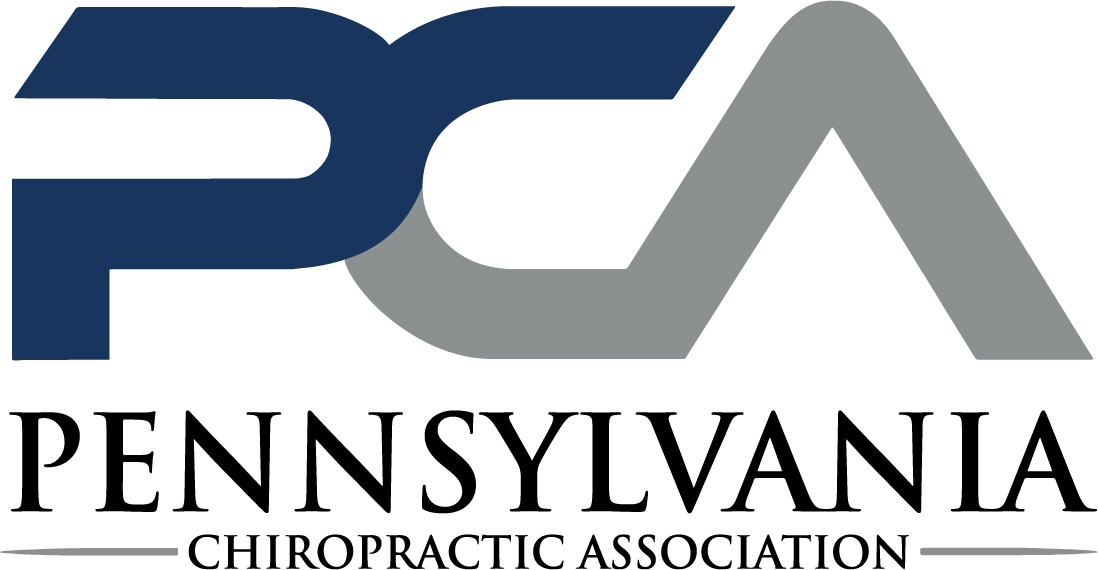Empowering Chiropractic Advocacy in Pennsylvania
Explore comprehensive resources and insights to strengthen your understanding and support of chiropractic advocacy efforts in Pennsylvania.
Expertise You Can Trust
Addressing Workforce Challenges & Expanding Employment Opportunities
Pennsylvania’s chiropractic community is facing a critical workforce challenge—but there is a clear path forward.
-
Grow Healthcare Jobs: Expanding access to chiropractic assistant roles will create new employment opportunities across Pennsylvania’s healthcare sector.
-
Support High-Quality Care: Enabling chiropractors to delegate routine therapeutic tasks allows them to focus on high-level clinical decision-making and patient outcomes.
-
Stay Competitive: Pennsylvania is currently one of the few states that prohibits delegation of therapeutic care. This puts our providers at a disadvantage compared to neighboring states with modernized laws.
The Certified Chiropractic Assistant (CCA) Bill establishes a clearly defined career pathway for those interested in chiropractic care. By implementing a statewide certification process, the bill creates a trained support workforce—empowering chiropractic practices while maintaining high standards of patient care.
To strengthen Pennsylvania’s chiropractic workforce and ensure long-term sustainability, we must modernize our approach. Supporting this legislation means creating jobs, improving care, and retaining the next generation of healthcare professionals.
Maintaining High Standards of Safety & Professionalism
The CCA Bill introduces a uniform, statewide certification process that ensures all chiropractic assistants are trained to meet nationally recognized standards for clinical safety and professionalism. By aligning with the Federation of Chiropractic Licensing Boards (FCLB), Pennsylvania will adopt the gold standard in chiropractic assistant education and oversight.
Certification will be administered by the National Board of Chiropractic Examiners (NBCE) and will include rigorous evaluation in the following core areas:
-
Foundational Knowledge (30%)
Anatomy, physiology, chiropractic terminology, and common therapeutic procedures. -
Patient Safety & Clinical Procedures (40%)
Safe use of therapeutic equipment, emergency protocols, x-ray safety, and identifying clinical contraindications. -
Documentation & Compliance (15%)
HIPAA standards, proper billing practices, fraud prevention, and accurate clinical record-keeping. -
Ethics & Professional Boundaries (15%)
Confidentiality, harassment prevention, professional conduct, and respectful patient interactions.
By establishing this structured, nationally aligned training and certification framework, the bill ensures that Certified Chiropractic Assistants (CCAs) will be competent, professional, and fully prepared to support chiropractic providers—while upholding the highest standards of patient care and clinical safety
Enhancing Office Efficiency & Reducing Costs in Chiropractic Care
By allowing certified chiropractic assistants (CCAs) to perform specific delegated therapeutic tasks, chiropractic offices can significantly improve workflow, reduce overhead, and expand access to care. The impact is immediate and measurable:
-
Shorter wait times, leading to faster service and improved patient satisfaction.
-
Lower operational costs, which can help make chiropractic care more affordable and accessible.
-
Reduced administrative workload, enabling chiropractors to concentrate on complex cases and direct patient treatment.
Empowering trained CCAs to support licensed chiropractors streamlines daily operations, enhances clinical capacity, and creates a more sustainable model of care—benefiting both providers and the communities they serve.
Enhancing Office Efficiency & Reducing Costs in Chiropractic Care
By allowing certified chiropractic assistants (CCAs) to perform specific delegated therapeutic tasks, chiropractic offices can significantly improve workflow, reduce overhead, and expand access to care. The impact is immediate and measurable:
-
Shorter wait times, leading to faster service and improved patient satisfaction.
-
Lower operational costs, which can help make chiropractic care more affordable and accessible.
-
Reduced administrative workload, enabling chiropractors to concentrate on complex cases and direct patient treatment.
Empowering trained CCAs to support licensed chiropractors streamlines daily operations, enhances clinical capacity, and creates a more sustainable model of care—benefiting both providers and the communities they serve.
Confronting the Workforce Crisis in Chiropractic
In-depth exploration of workforce challenges reveals the critical need for more chiropractors to meet growing patient demand. Scope modernization is essential to expanding chiropractors’ capabilities, ensuring they can provide comprehensive care. Addressing patient access concerns involves advocating for policies that remove barriers and promote equitable healthcare access. These articles offer valuable insights and strategies to overcome these challenges, empowering practitioners to drive positive change in the chiropractic field.
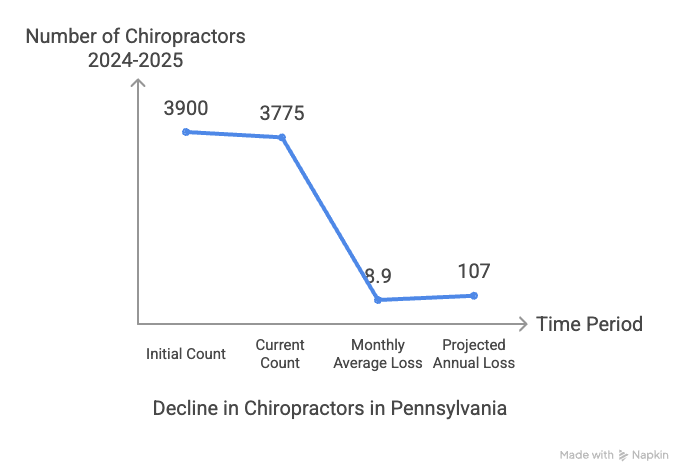
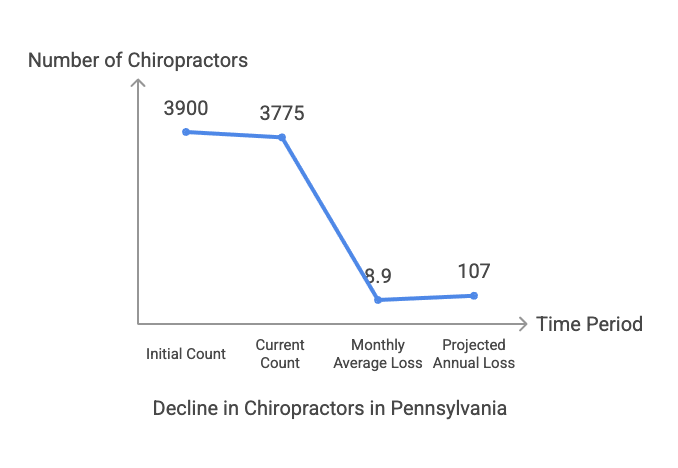
A Shrinking Workforce with Rising Demand
Pennsylvania is experiencing a severe and accelerating chiropractic workforce shortage. Projections show the state could lose over 100 chiropractors each year over the next decade, while new practitioner entry is falling far short of what’s needed to replace them. This growing shortfall directly threatens access to care across the Commonwealth.
Retirement Looms, Recruitment Lags
With many chiropractors nearing retirement, Pennsylvania faces a shrinking pipeline of replacements. The lack of structured support, incentives, and career pathways is causing younger practitioners to leave the profession—or the state—altogether, especially in rural and underserved communities.
Mounting Financial Pressures on Practices
Chiropractic providers are navigating an increasingly unsustainable financial environment.
-
Insurance reimbursements continue to decline.
-
Patient copays are rising, discouraging regular visits.
These trends are making it harder for practices to stay open and for patients to access consistent, preventive care, despite chiropractic being a proven, non-opioid alternative for musculoskeletal pain.
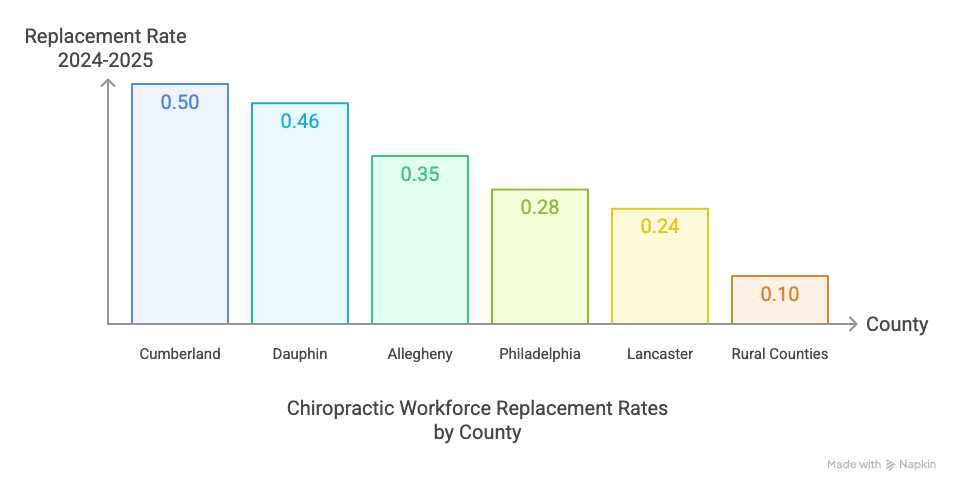
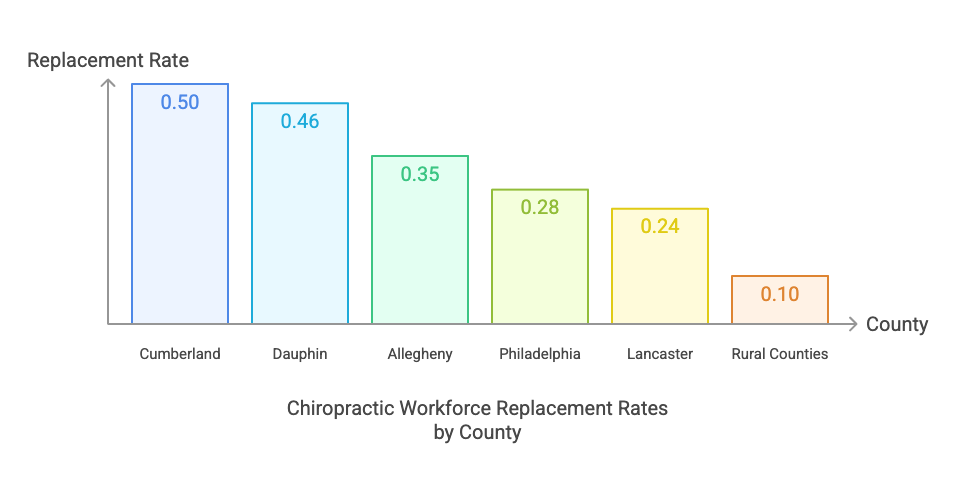
An Access Crisis on the Horizon
If left unaddressed, this workforce shortage will leave thousands of Pennsylvanians without meaningful access to conservative, whole-person care. Chiropractic isn’t just about back pain—it’s a comprehensive approach to health that focuses on long-term outcomes without medication. In the midst of a national opioid crisis, we can’t afford to let this resource disappear.
Modernizing Care Delivery with HB1106
House Bill 1106 offers a smart, immediate step forward. The bill would restore chiropractors’ ability to delegate therapeutic exercises to certified assistants, which would:
-
Reduce provider burnout by easing workload pressure.
-
Create new job pathways for entry-level professionals.
-
Bring Pennsylvania in line with best practices adopted by other states.
This isn’t just about the scope of practice, it’s about securing the future of chiropractic care in Pennsylvania. HB1106 is a foundational solution to build stability, expand access, and support a modern, sustainable care system.
PCA is leading the charge, and the time to act is now.
Common Questions and Answers
Explore our frequently asked questions to find clear answers and effective messaging guides tailored to support your advocacy efforts.
Q1: What is HB1106, and why is it important?
A: HB1106 is legislation that would restore chiropractors’ ability to delegate basic therapeutic exercises to certified chiropractic assistants (CCAs) in Pennsylvania. This bill addresses a workforce crisis, removes outdated restrictions, and aligns Pennsylvania with national best practices, improving access to conservative, non-opioid care.
Q2: Why can’t chiropractors currently delegate therapeutic exercises in PA?
A: A legal decision in State Farm vs. Cavoto interpreted the state’s scope of practice in a way that prohibits chiropractors from delegating therapeutic care, despite longstanding precedent. HB1106 corrects this by creating a formal certification process for chiropractic assistants.
Q3: How will this legislation help with workforce challenges?
A: Pennsylvania is losing over 100 chiropractors annually, while new practitioner entry is not keeping pace. HB1106 establishes a certified assistant role that helps extend care capacity, supports chiropractors, and provides new job pathways within the healthcare system.
Q4: Will this affect patient safety?
A: No. HB1106 enhances safety. It mandates a rigorous certification process, aligned with national standards from the Federation of Chiropractic Licensing Boards (FCLB) and administered by the National Board of Chiropractic Examiners (NBCE).
Q5: What does CCA certification involve?
A: Certification includes testing in:
- Foundational knowledge (30%)
- Patient safety & procedures (40%)
- Documentation & compliance (15%)
- Ethics & boundaries (15%)
This ensures CCAs are professionally trained and prepared to work under direct supervision.
Q6: How will this impact chiropractic office efficiency?
A: Delegation of therapeutic tasks reduces chiropractor workload, shortens patient wait times, and lowers operational costs. This allows practices to serve more patients effectively, especially in high-demand or rural areas.
Q7: Does this bill expand the scope of chiropractic in PA?
A: No. HB1106 does not expand the scope. It simply restores a chiropractor’s ability to delegate care, which is standard until the court ruling changes its interpretation.
Q8: How does Pennsylvania compare to other states?
A: Pennsylvania is currently an outlier. Most states allow therapeutic delegation under appropriate supervision. HB1106 aligns Pennsylvania with the healthcare models already used in physical therapy, dentistry, and medicine.
Q9: What role does this bill play in supporting small businesses and rural healthcare?
A: Many chiropractic offices are small businesses. Without delegation, their efficiency suffers. HB1106 allows these clinics—especially in rural areas—to remain open, hire local staff, and increase patient access.
Q10: Who supports HB1106?
A: The Pennsylvania Chiropractic Association (PCA), its members, national regulatory bodies (FCLB, NBCE), healthcare professionals across the state, and 26 bipartisan members of the Pennsylvania House of Representatives who recognize the urgent need for workforce modernization and patient-centered reform.
Q11: What’s at risk if this bill doesn’t pass?
A: Without reform, Pennsylvania will continue to lose chiropractors and struggle to meet care demand. Practices will remain restricted, leading to delayed care, increased patient costs, and decreased access to non-opioid treatment options.
Q12: How can I support HB1106?
A: Visit StandWithChiroPA.org to email your legislator, share our advocacy video, or download tools to engage your community. Every voice matters.
Have more questions?
Email us at info@pennchiro.org or visit our Advocacy Resource Hub for additional articles, tools, and talking points.
Action Tools and Templates
Contact Your State Legislator in Support of HB1106
Enter your ZIP code to identify your Pennsylvania state representative and send them a message urging support for HB1106.
